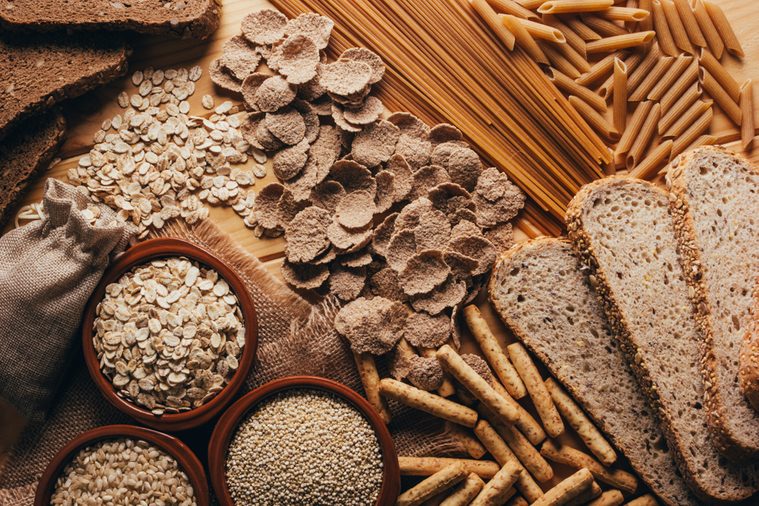Here’s How Many Carbs You Should Eat to Live Longer, Says Science
Updated: Oct. 21, 2022
How many carbohydrates should you eat in a day? (No, the answer isn't "Zero"!)

Low-carb diets might be good for the waistline, and losing weight can certainly be a healthy move. But carbohydrates wouldn’t be a macrobiotic essential of the human diet if we didn’t need them. Are carbs healthy for you? In fact, they are—and in particular, a recent study published in the Lancet Public Health found that a moderate amount of carbohydrates may extend one’s lifespan.
Over a period of 25 years, researchers from Brigham and Women’s Hospital in Boston, MA, tracked and analyzed the diets of more than 15,000 middle-aged U.S. adults. After adjusting for lifestyle factors such as exercise habits, smoking status, etc., the study’s authors found that people who get about half of their total calorie intake from carbohydrates each day had a lower risk of early death, compared to people who ate more than 70%, or less than 40%, of their total calories from carbohydrates.
These 8 Myths About Carbs Could Be Wrecking Your Health
In fact, 50-year-olds who ate a moderate amount of carbohydrates at age 50 were projected to live another 33 years, compared to high-carbohydrate eaters and low-carbohydrate eaters, who were given a total life expectancy of 79 and 82 years, respectively. The results were corroborated by existing studies from other countries across the globe, which also revealed similar trends between carbohydrate intake and life expectancy.
Aside from the quantity, it makes sense that the authors noted the quality of the carbohydrates is also likely to play an influential role in general health and mortality risk. The researchers explained that people who load up on the carbs may also be consuming large amounts of refined carbohydrates, like packaged sweets and white bread. Simple carbohydrates like these lack nutritional value and may lead to health and obesity consequences over time.
On the other end of the spectrum, some people who cut carbs end up replacing them with meat and dairy products that come high in saturated fat. This may increase the risks for heart disease, some cancers, and other serious health problems. Fruits and vegetables will yield healthier carbs, as well as vitamins, minerals, and antioxidants that help fight disease. Whole grains like wheat, oatmeal, and brown rice are foods that also deliver healthy carbs while promoting other health benefits.
This Hidden Oatmeal Benefit Could Lower Your Cholesterol, According to Research
The researchers pointed out that their data was based purely on observations that don’t prove a cause-and-effect relationship between death and eating too many or too few carbohydrates. Just keep in mind that if you do decide to cut carbs, you should replace them with healthier plant-based proteins and fats such as beans or nuts. Eating This Nut Will Help Your Gut and Reduce Inflammation, New Study Says
Next, read up on the 12 silent signs you need to eat more carbs.
Follow The Healthy on Facebook, Instagram, and Twitter and get wellness wisdom in your inbox from our newsletter.